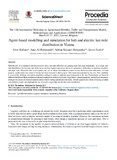Agent-based modelling and simulation for hub and electric last mile distribution in Vienna
Fecha
2023Versión
Acceso abierto / Sarbide irekia
Tipo
Artículo / Artikulua
Versión
Versión publicada / Argitaratu den bertsioa
Identificador del proyecto
Impacto
|
|
10.1016/j.procs.2023.03.094
Resumen
With the rise of e-commerce and door-to-door sales, last-mile deliveries are gaining more and more importance. As a result, last-mile distribution has become one of the most sensitive logistics processes due to its uniqueness, difficulties in meeting schedules, and high costs. Therefore, this work explores the use of urban consolidation centers to ease these last-mile difficulties. For that purpo ...
[++]
With the rise of e-commerce and door-to-door sales, last-mile deliveries are gaining more and more importance. As a result, last-mile distribution has become one of the most sensitive logistics processes due to its uniqueness, difficulties in meeting schedules, and high costs. Therefore, this work explores the use of urban consolidation centers to ease these last-mile difficulties. For that purpose, a hub in the city center of Vienna has been selected to deliver up to 150 clients disseminated by the city. This suitability is assessed by defining convenient simulation settings in order to replicate parcel demands in the city. Experiments are based in different hub-based fleets (traditional internal combustion vehicles or electric cargo bikes), demand patterns, and delivery frequency strategies by means of a biased randomization vehicle routing optimization heuristic. Results quantify the effects of having an urban consolidation center and highlight the use of electric cargo bikes for the last-mile distribution. [--]
Materias
Last-mile distribution,
Logistics,
Simulation,
Optimization,
Heuristics
Editor
Elsevier
Publicado en
Procedia Computer Science 220, 2023
Notas
Trabajo presentado en: The 12th International Workshop on Agent-based Mobility, Traffic and Transportation Models,
Methodologies and Applications (ABMTRANS)
March 15-17, 2023, Leuven, Belgium
Departamento
Universidad Pública de Navarra/Nafarroako Unibertsitate Publikoa. Institute of Smart Cities - ISC
Versión del editor
Entidades Financiadoras
This work has been partially supported by the Spanish Ministry of Science, Innovation, and Universities (RED2018-102642-T; PID2019-111100RB-C22/AEI/10.13039/501100011033) and the SEPIE Erasmus+ Program (2019-I-ES01-KA103-062602). Additionally we acknowledge the support from the Public University of Navarra for
Young Researchers Projects Program (PJUPNA26-2022).







